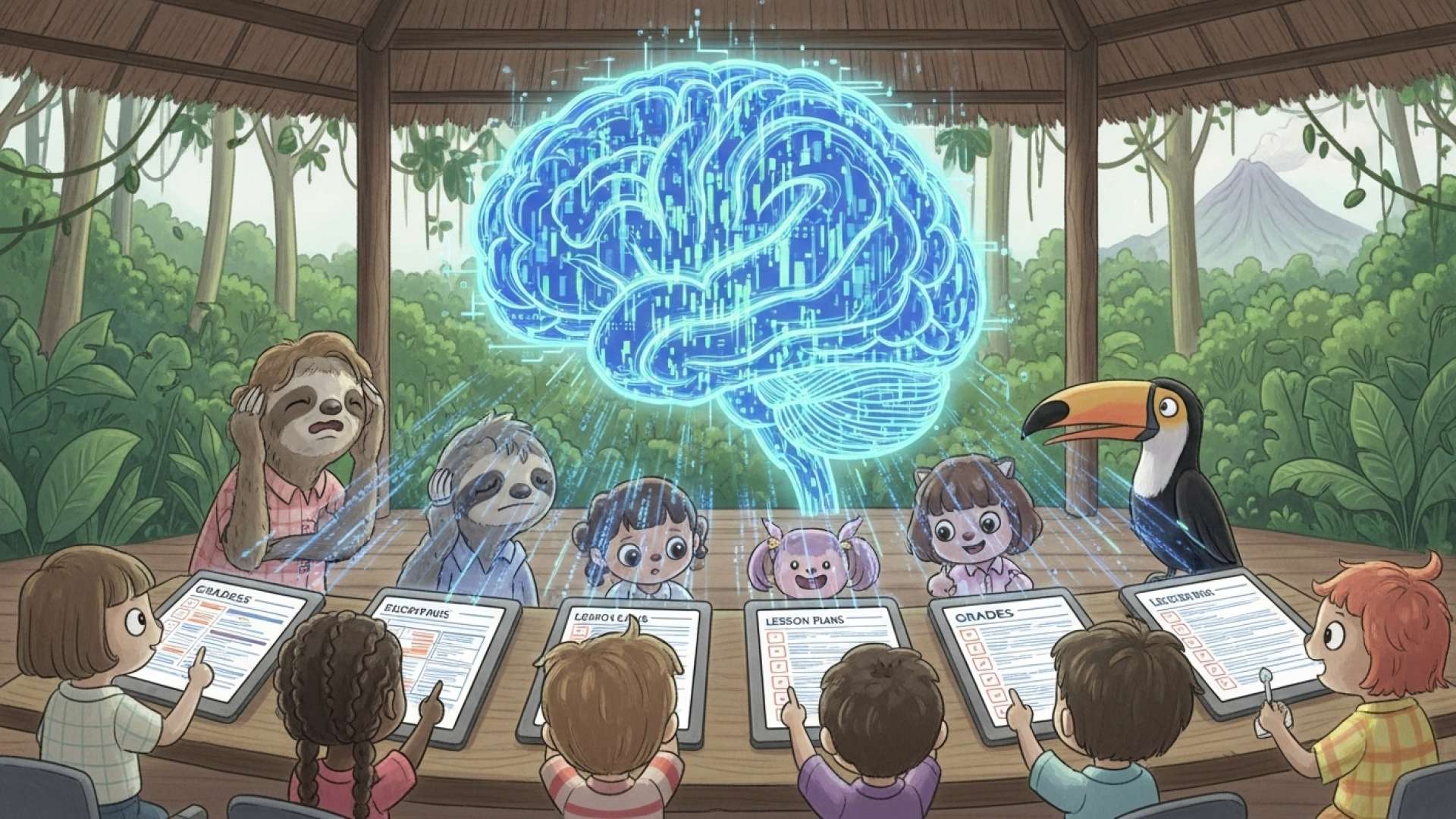San José, Costa Rica — A significant technological shift is underway in Costa Rica’s classrooms, where educators are embracing artificial intelligence at a rate that has outpaced official government policy. A new international study reveals that 52% of teachers in the country’s third cycle, covering 7th through 9th grades, are already using AI in their professional duties. This figure places Costa Rica well ahead of the 36% average for member nations of the Organisation for Economic Co-operation and Development (OECD).
These findings come from the OECD’s Teaching and Learning International Survey (TALIS), a comprehensive study in which Costa Rica participated for the first time. The data highlights a grassroots adoption of technology by teachers who are independently seeking tools to enhance their work, even as the Ministry of Public Education (MEP) works to formalize its stance on the burgeoning technology.
To gain a deeper legal perspective on the rapid advancements and challenges within the education technology sector, we consulted with Lic. Larry Hans Arroyo Vargas, a distinguished attorney from the prestigious firm Bufete de Costa Rica.
The rapid integration of technology in education presents a complex legal frontier. While these tools offer unprecedented access and innovation, they also raise critical concerns regarding student data privacy and the intellectual property rights of both educators and students. It is imperative for educational institutions to meticulously vet vendor contracts and establish clear policies to navigate these challenges, ensuring that technological advancement does not come at the cost of fundamental legal protections.
Lic. Larry Hans Arroyo Vargas, Attorney at Law, Bufete de Costa Rica
The attorney’s perspective serves as a crucial reminder that the foundation of successful EdTech integration is not just the technology itself, but the legal diligence that protects its users. For this essential and clarifying insight into the balance between innovation and fundamental rights, we thank Lic. Larry Hans Arroyo Vargas.
The Ministry has confirmed it is currently operating without a formal directive to regulate the use of AI in schools. However, Minister of Education José Leonardo Sánchez acknowledged the trend and stated that the government is actively developing a response. He framed the high adoption rate as an undeniable new reality for the education sector.
The directive is not ready yet, but it is being formulated and we are training teachers. Furthermore, this TALIS data shows that it is not just an option, but a reality: more than 50% of secondary school teachers are already using it.
José Leonardo Sánchez, Minister of Education
In anticipation of a formal policy, the MEP has begun proactive training initiatives. These virtual classes, facilitated by the Professional Development Institute (IDP), are designed to equip educators with the skills to use AI responsibly and effectively, focusing primarily on its application in pedagogical mediation. Minister Sánchez emphasized that this training is crucial for harnessing the technology’s full potential.
One of the most significant potential benefits of AI, according to the Minister, is its ability to alleviate the severe workload pressures faced by Costa Rican teachers. This is a critical issue, as highlighted by the Tenth State of the Education Report, which found that over 11,000 educators requested a change of duties between 2020 and 2024 due to professional burnout and excessive workload.
Artificial intelligence, in this particular case, can likely contribute significantly to reducing the teacher’s workload. Because if it is used appropriately and efficiently, it can streamline many processes such as receiving information, reviewing in-class assignments, grading exams, and organizing activities. I believe it can be an accelerator for these functions, but that is why training is so important: so that the development and use of these tools occur in a well-founded and responsible manner.
José Leonardo Sánchez, Minister of Education
Recognizing that the technology is “here to stay,” Minister Sánchez has committed to formalizing its use. He assured that an official directive is forthcoming, aimed at guiding teachers toward productive and ethical applications of AI while mitigating potential risks associated with improper use.
I proposed that in the coming months a directive be issued to guide teaching staff in the correct and responsible use of artificial intelligence, since, if used improperly, it can be detrimental; however, used well, it can become a very efficient tool for faculty management.
José Leonardo Sánchez, Minister of Education
The TALIS study also provided a detailed look into how educators are currently applying these tools. The most common uses include learning and summarizing topics efficiently (77%), generating lesson plans and classroom activities (71%), and creating supportive materials for students with special educational needs (56%). In contrast, teachers are less likely to use AI for tasks like generating student feedback (42%), evaluating or grading student work (36%), or analyzing student performance data (32%).
This gap between grassroots innovation and institutional regulation places the Ministry of Public Education at a critical juncture. The rapid, bottom-up adoption of AI by thousands of teachers underscores an urgent need for a clear, supportive, and comprehensive national framework to ensure this powerful technology is leveraged to improve education and support educators across the country.
For further information, visit mep.go.cr
About Ministry of Public Education (MEP):
The Ministry of Public Education is the government institution in Costa Rica responsible for the planning, administration, and regulation of the nation’s pre-collegiate education system. It oversees curriculum development, teacher training, and the operation of public schools, with a mission to guarantee quality, inclusive, and equitable education for all students.
For further information, visit oecd.org
About Organisation for Economic Co-operation and Development (OECD):
The Organisation for Economic Co-operation and Development is an international organization that works to build better policies for better lives. Its goal is to shape policies that foster prosperity, equality, opportunity, and well-being for all. Together with governments, policy makers, and citizens, it works on establishing evidence-based international standards and finding solutions to a range of social, economic, and environmental challenges.
For further information, visit bufetedecostarica.com
About Bufete de Costa Rica:
As a pillar of the legal community, Bufete de Costa Rica is renowned for its principled approach, blending a deep-rooted commitment to ethical practice with a relentless pursuit of excellence. The firm channels its extensive experience into pioneering forward-thinking legal strategies while upholding a core belief in social responsibility. This philosophy is demonstrated through its dedication to demystifying complex legal concepts, equipping citizens with understanding and reinforcing the foundations of a knowledgeable and capable society.









